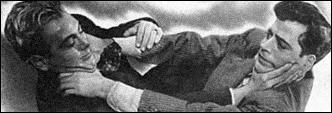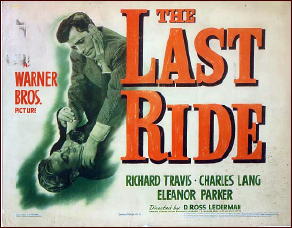Tue 14 Oct 2014
THE LAST RIDE. Warner Brothers, 1944. Richard Travis, Charles Lang, Eleanor Parker, Jack La Rue, Cy Kendall, Wade Boteler, Mary Gordon. Director: D. Ross Lederman.

One of the players in this film was later nominated for three Oscars, and it wasn’t either the leading player, Richard Travis, whose career never got out of first gear, nor was it Cy Kendall, even though he was always, as he is in this film, the best villain around, and always worth watching — the oiliest, the most conniving, and in a good old-fashioned way, a wonderful toad of a fellow with a eye always on whatever money he can make in whatever scheme seems the most profitable at the time.
And in The Last Ride, made in 1944 — war time, in other words, when rubber was scarce — that’s where the money is. In spite of the patriotic message this movie was intended to send, supporting the war effort, Mr Kendall is not only a captain in the police department, but he’s also the secret head of a gang of black marketeers in the tire business.
Problem is, the tires are shoddy, and as a result a couple of kids on a joy ride end up dead in a ditch. Travis plays Pat Harrigan, a detective on one side of the law, while his brother Mike is on the other and one of the members of the gang. They both have their eye on a girl named Kitty Kelly (Eleanor Parker), but her part in the story all but disappears after 30 minutes into the story, not much over the halfway point.
Travis tries to pull of the oldest gambits in the books, from the police department’s point of view, and the tale peters out from there. The beginning’s not bad, and some money was put into the production, but when a key point in the tale is covered in a letter to the police captain, one that has to read by the audience on the screen, instead of a short two minute scene that could have shown the same thing, you have to know that corners had to be cut somewhere, and it shows.

October 15th, 2014 at 7:13 am
I have to agree with this review: The Last Ride is not much of a movie.
Few things are more relaxing than curling up with a nice little B-movie whodunit gem. Unfortunately, this movie is not one of them. It’s Dullsville.
October 15th, 2014 at 10:27 am
I knew Charles Lang who described himself as an actor as handsome as hell but untalented. By the time he made the transition to screenwriting most of his good looks had vanished, though there was a remnant if anyone thought the search worthwhile. He wrote four fairly weak films for Budd Boetticher, Killer Shark with Roddy McDowall as both star and co-producer, I suppose at low ebb for Roddy, then Magnificent matador, with big time actors Anthony Quinn and Maureen O’Hara, followed by Decision At Sundown and Buchanan Rides Alone, part of the so-called Ranown cycle, and though weakest amongst that group, playable. Louis bought a script Charles had written called The Moment of Truth, with the idea that he would produce, direct and play one of the two principal male parts, and actually had an offer from WB — which he turned down. That leads into t he present day when the last surviving Hayward family member gave me the script last April. We will see what happens.
I might add that Charles was affable but not so great under pressure. Like an hysterical old auntie.
October 15th, 2014 at 1:57 pm
Barry
Thanks for the background information on Charles Lang, a name that’s still only a name to me. I watched this movie a couple of weeks ago, but the review has been backlogged ever since, and in the meantime, I cannot put a face to the name. He played the crooked brother in this one, but only Cy Kendall as an actor stands above the totally generic.
As for Richard Travis, I probably couldn’t pick him out of a crowd either.
But that Lang went on to be a screenwriter, that’s something I found interesting, and I’m glad you told us about him.
October 15th, 2014 at 3:17 pm
This one is pretty dull, worth seeing Kendal in most things and Parker in anything, but not so much the rest of the cast.
The black market was a difficult subject for Hollywood to tackle during the war though they made some half hearted efforts, usually in passing rather than as the main event as here.
Like prohibition almost everyone was either violating the law at some level or had a family member who was so audiences might not react well to being chided every time they went to a movie. It wasn’t until the end of the war that the black market for penicillin became fair game for villains but even then it was always over seas.
In some big hub ports like Houston the black market was virtually wide open and almost everyone was involved if only at a small level — gas, steak, nylons, tires. It was safer to tackle in England where the hardships were greater and it could be portrayed as undermining the war effort and unfair without alienating so many audience members.
June 26th, 2019 at 7:58 am
In order to recognize Richard Travis (Bert in Man Who Came to Dinner) you need to be conversant with movies like Catwomen of the Moon (with Marie Windsor and Victor Jory).
October 19th, 2023 at 3:02 pm
To replace the YouTube video, now deleted, try this link:
https://archive.org/details/last-ride-1944-